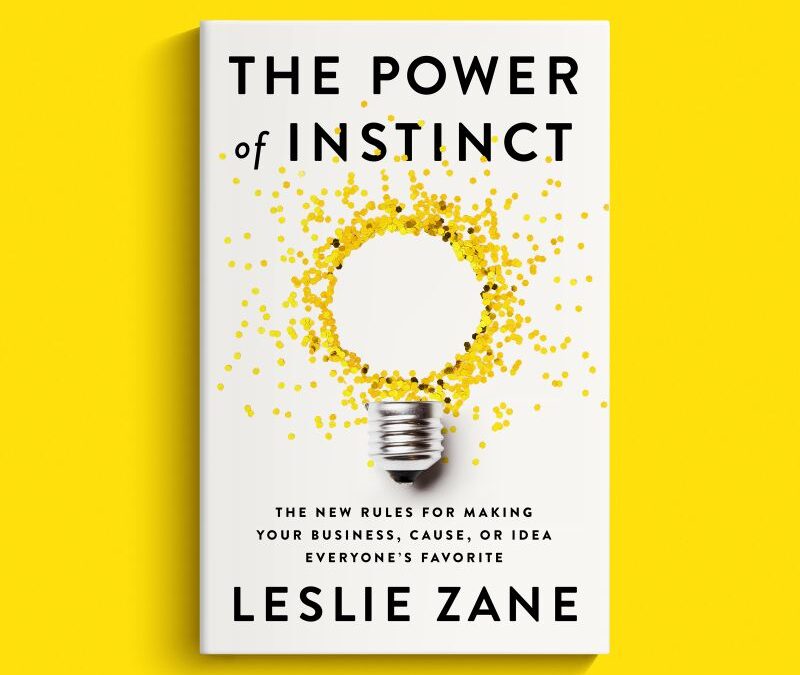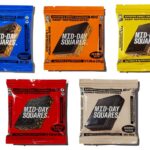A provocative new book called The Power of Instinct by Leslie Zane
I read many marketing and branding books and rarely find original thinking. This book is different, or I should say – distinctive.
I’m a big fan of a counterintuitive or contrarian perspective, which allows me to rethink my beliefs. Leslie Zane has created a brilliant new contribution to the world of marketing.
In this groundbreaking book “The Power of Instinct,” Leslie Zane challenges long-held beliefs about consumer behavior and brand loyalty.
Drawing from her extensive experience in marketing and brand strategy, Zane presents a fresh perspective that places instinct at the forefront of decision-making processes. This review explores my takeaways from the critical concepts of Zane’s work and examines how they represent a departure from conventional marketing wisdom.
I love a contrarian whose thinking is based on experience, science, and critical thinking.
The Central Thesis
Zane’s core argument is that instinct drives most consumer decisions rather than conscious thought. She contends that marketers have long focused on appealing to consumers’ rational minds, neglecting the decisive role that subconscious impulses play in shaping preferences and behaviors.
This insight forms the foundation of her approach to brand building and customer engagement.
The Instinct-First Approach
According to Zane, successful brands tap into consumers’ instinctive responses. She argues that people make decisions in milliseconds, often before their conscious mind has had time to process information. This rapid, intuitive decision-making is based on a complex web of associations stored in the subconscious mind. Marketers can create stronger, more resilient brands by understanding and influencing these associations.
Challenging Traditional Market Research
One of the most controversial aspects of Zane’s work is her critique of traditional market research methods. She argues that focus groups, surveys, and other standard tools often fail to capture the proper drivers of consumer behavior because they rely on conscious, verbal responses. Zane suggests that these methods may even lead marketers astray by emphasizing rational factors that play a minimal role in purchasing decisions.
The Power of Positive Associations
Zane emphasizes the importance of building positive associations with a brand. Unlike traditional approaches focusing on unique selling propositions or product features, her method centers on creating positive connections in the consumer’s mind. These associations, she argues, are what truly drive brand preference and loyalty.
Redefining Brand Loyalty
In “The Power of Instinct,” Zane challenges the conventional understanding of brand loyalty. She posits that true loyalty is not about conscious commitment or rational preference but rather an instinctive, emotionally driven attachment to a brand. This perspective shifts the focus from cultivating explicit brand advocates to fostering deep-seated, positive associations.
The Role of Emotion in Decision-Making
While the importance of emotion in marketing is not a new concept, Zane takes it a step further. She argues that emotions are not just influencers of decisions but are inextricably linked to the instinctive responses that drive choices. This view challenges marketers to think beyond creating emotional advertising and instead focus on embedding positive emotional associations at every brand touchpoint.
Rethinking Customer Segmentation
Zane’s work also has implications for how marketers approach customer segmentation. Instead of dividing consumers based on demographic or psychographic factors, she suggests focusing on shared instinctive responses. This approach can lead to more effective targeting and messaging strategies that resonate more deeply with consumers.
The Limitations of Conscious Choice
Throughout the book, Zane challenges the notion that consumers make primarily rational, conscious choices. She presents evidence suggesting that subconscious instincts drive many decisions attributed to careful consideration. This insight questions many traditional marketing strategies that educate consumers or appeal to their logical decision-making processes.
Implications for Brand Strategy
Zane’s ideas have far-reaching implications for brand strategy. She advocates for a holistic approach that considers every aspect of the brand experience, from product design to customer service, as an opportunity to reinforce positive instinctive associations. This perspective challenges marketers to think beyond traditional advertising and consider how every interaction shapes the consumer’s subconscious perception of the brand.
The Science Behind Instinct
To support her arguments, Zane draws on research from neuroscience and psychology. She explores how the brain processes information and makes decisions, often bypassing conscious thought. This scientific grounding lends credibility to her unconventional ideas and gives marketers a new framework for understanding consumer behavior.
Practical Applications
While much of “The Power of Instinct” focuses on theory, Zane also provides practical advice for applying her insights. She offers strategies for uncovering and influencing the automatic associations that drive brand preference and techniques for measuring the effectiveness of instinct-based marketing efforts.
Key Points and Contrarian Views:
• Most consumer decisions are driven by instinct, not conscious thought. This contrasts with a traditional focus on rational decision-making models.
• Traditional market research methods are flawed and potentially misleading. Challenges the reliability of focus groups, surveys, and other standard tools.
• Brand loyalty is based on automatic, emotional attachments rather than rational commitment. Contradicts conventional views on cultivating brand advocates.
• Customer segmentation should be based on shared instinctive responses, not demographics or psychographics. Opposes traditional segmentation strategies.
• Consumers make fewer conscious choices than commonly believed. Challenges the effectiveness of educational marketing approaches.
• Every brand interaction shapes subconscious associations, not just advertising. Expand the scope of brand management beyond traditional marketing channels.
• Positive associations are more important than unique selling propositions. Shifts focus from product features to emotional connections
• Emotional responses are integral to intuitive decision-making, not just influencers. Deepens the understanding of emotion’s role in marketing
• Effective marketing requires influencing subconscious associations. Contrasts with strategies focused on conscious messaging and positioning
• Brand success depends on tapping into millisecond decisions. Challenges the notion that consumers carefully weigh options before purchasing.
This bullet point list summarizes the critical contrarian views in “The Power of Instinct,” highlighting how Zane’s ideas challenge traditional marketing and branding concepts.
Challenges and Criticisms
As with any paradigm-shifting work, Zane’s ideas have faced criticism. Some argue that her emphasis on instinct oversimplifies the complexities of human decision-making. Others question the practicality of her approach, particularly for smaller brands with limited resources. Zane addresses these concerns in the book, but the debate surrounding her ideas will likely continue.
Conclusion
“The Power of Instinct” offers a provocative and potentially transformative perspective on marketing and branding. Zane challenges marketers to rethink their fundamental assumptions and strategies by placing instinct at the center of consumer behavior.
While her ideas may be controversial, they provide a fresh perspective on the challenges of building and maintaining strong brands in today’s competitive marketplace.
Whether one fully embraces Zane’s approach, “The Power of Instinct” is a thought-provoking read that encourages marketers to question long-held beliefs and consider new ways of connecting with consumers. As the marketing landscape continues to evolve, Zane’s insights into the role of instinct in decision-making may prove increasingly valuable.
Here is a podcast interview she did on The Marketing Book Podcast if you want to learn more in her words. Better yet, buy the book and then listen.
Connect with Jeff at The Marketing Sage Consultancy. Interested in setting up a call with me? Use my calendly to schedule a time to talk. The call is free, and we can discuss your brand and marketing needs. If you want to learn more about my new offering, The Trusted Advisor Board, you can click here to learn the details. Feel free to email me at jeffslater@themarketing sage.com or text 919 720 0995. Thanks for your interest in working with The Marketing Sage Consultancy.





